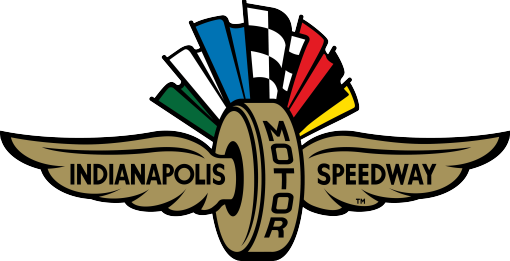

Racing Toward Zero
Sustainability Initiatives of IMS
Indianapolis Motor Speedway’s history is rooted in tradition and innovation. Throughout time, IMS has been a proving ground for new industry products and best practices, driving progress forward at a pace befitting the 230+ m.p.h. laps turned at the Indy 500. Below, learn more about what IMS is doing to reduce waste and become more energy efficient and how fans can join in and do their part.
In 2023, Penske Entertainment, parent company of the NTT INDYCAR SERIES and Indianapolis Motor Speedway, developed its first sustainability report.

Fast Facts
IMS has the world’s largest solar farm based at a sporting facility.
In 2023, IMS composted 22.51 tons of food waste.
Specialty IMS souvenir shirts made from recycled materials prevent 32,832 plastic bottles from landfills.
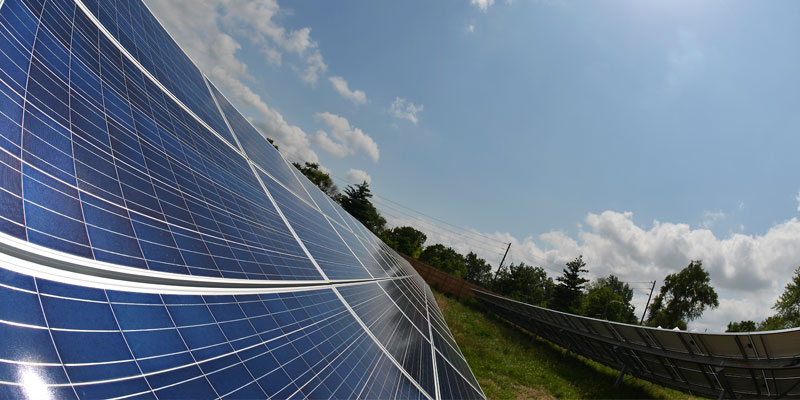
Energy
In 2020, Indianapolis Motor Speedway invested heavily in smart infrastructure improvements throughout the facility. The first round of upgrades included restroom renovations that employed new water conservation measures, replacement of paper towel dispensers with electric hand dryers, and upgraded lighting throughout all concessions and restrooms to energy-efficient LEDs. Facility enhancements continue with IMS investing a quarter million dollars to replace all remaining outdoor lighting with energy-efficient LEDs. IMS has partnered with Shell Energy to develop a master energy plan for the venue including HVAC enhancements, energy management control systems, and future onsite energy generation opportunities.
Since 2021, IMS has purchased renewable energy credits through the local utility, Applied Energy Services, for its entire annual electric consumption footprint.
IMS is home to the largest solar field at a sports facility. The solar farm sits on more than 40 acres of land and has nearly 40,000 solar modules generating 9 MW of power, enough energy to power more than 1,000 homes in the local community.
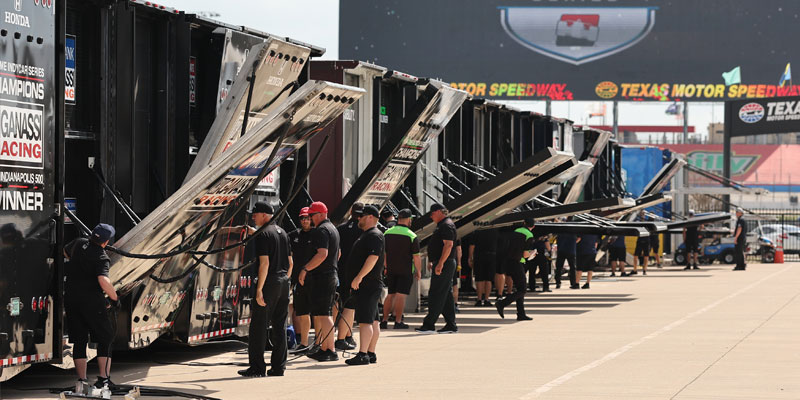
Transportation
As the home of the world’s largest single-day sporting event, transportation is a key opportunity for IMS to have a positive impact on its overall carbon emissions. Focused on fan travel, IMS offers shuttles from multiple locations in and around Indianapolis. Beginning in 2016 with the 100th Running of the Indianapolis 500, Bike to the 500 became a new Race Day tradition, with more than 1,000 fans opting to participate in an escorted bike ride to the racetrack. For fans riding throughout the month, IMS invested in bike parking at key entrances to the facility. For those traveling via more traditional methods, an opportunity to offset their travel can be chosen when purchasing or renewing Race Day tickets. Through CHOOOSE, a carbon offset purchasing platform, fans support critical environmental programs, which in the past has included restoration of natural habitats in the Mississippi Alluvial Valley.
Transportation is also a key part of IMS’ business. In 2022, IMS installed the state’s first commercial vehicle charging station, which then charged the Freightliner eCascadia trucks used to transport all race tires from Firestone to IMS during the Month of May. In 2023, two of the first production version trucks will come straight from the Portland, OR manufacturing line to IMS to support Firestone's zero-emission tire transport network.
In addition to the electric charging options, IMS is the only current renewable diesel hub in the state of Indiana. Renewable diesel fuels the INDYCAR transporters hauling team cars to the racetrack, including all NTT INDYCAR SERIES transporters as well as IMS Productions transporters. You can learn more about the work INDYCAR is doing with renewable diesel here.
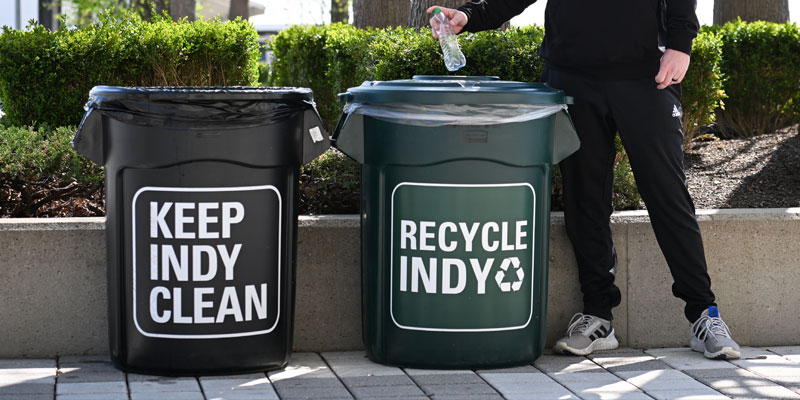
Waste Diversion
Waste diversion, a key area of focus for Indianapolis Motor Speedway, cuts greenhouse gas emissions, limits the volume of pollutants that find their way into air and water, and saves energy and natural resources. IMS has reduced its waste footprint through recycling, composting, food recovery, and donations. Click on the icons to learn more about each of these initiatives.
Waste Diversion Facts
Recycling
In 2023, IMS recycled 377.21 tons of material from events and operations that would've otherwise went to landfill. Additionally, IMS has employed the help of Keys2Work, an Indianapolis-based nonprofit that helps homeless and justice-involved citizens successfully transition into the workforce through employment assistance, workforce certifications, workplace mentoring, and job placement services. Keys2Work will be onsite throughout the Month of May, sorting recycled items and removing all non-recyclable materials to ensure a low contamination rate. IMS is focused on finding solutions to reduce waste from all its major events.
IMS is replacing plastic cups in suites and hospitality areas with infinitely recyclable aluminum Ball cups, a partnership with Penske Logistics, Novelis, and Ball. Learn more about the 100% circularity of the cups here.
Education is an important part of IMS’ success around recycling. Learn more about the Three Rules of Recycling from Team Penske’s Scott McLaughlin here!
Composting
There are two components of IMS’ composting program: event-based food composting and operational composting of mixed-yard waste. During events, RE317, a local, women-owned business, hauls food scraps from catering kitchens, suites, and concessions to GreenCycle, a composting facility located in Indianapolis. In total, IMS composted 22.51 tons of food waste in 2023.
Additionally, as part of a program that launched in January 2023, the IMS grounds team collects mixed yard waste from landscaping and mowing to compost at GreenCycle.
Food Recovery and Donations
Minimizing food waste is a key goal at IMS. Through its partnership with Gleaners Food Bank of Indiana, IMS launched a pilot project to reduce food waste at the Indianapolis 500 in May 2022. During the month, nearly 4,000 pounds of unused prepared food was stored, refrigerated, and sent to Gleaners Food Bank of Indiana. IMS has since expanded this program and donated 6,967 meals in 2023.
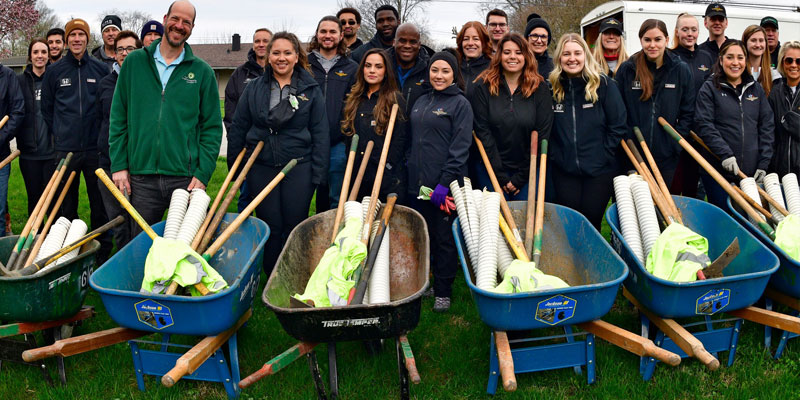
Ecosystem
Indianapolis Motor Speedway is committed to doing its part to take care of the environment both inside and outside of its grounds. Sitting on 1,000 acres, IMS is home to more than 196 plants and 57 animal species.
IMS has an important role in the local community and is proud to support hundreds of important causes year-round. IMS has supported additional programs by gathering individuals throughout the NTT INDYCAR SERIES paddock to participate in activities, such as a tree planting just north of the gates at IMS. More than 50 people participated and planted over 80 trees in one morning.
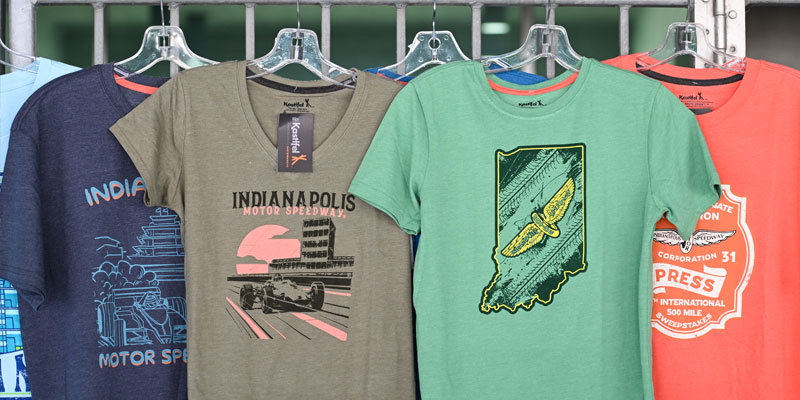
Retail
IMS offers a variety of sustainably sourced merchandise, working with organizations like Kastlfel, People for Urban Progress, and Utopia Plastix. This includes apparel sourced from recycled plastic bottles, upcycled banners and signage from events at IMS, and compostable retail bags.
